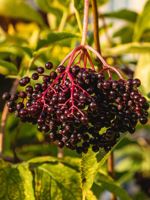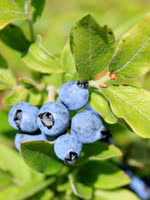Mon-Fri 9am - 5pm Mountain time
Common Blueberry vs Bob Gordon Elderberry
Sambucus canadensis Bob Gordon
Vaccinium myrtilloides
NOT AVAILABLE THIS SEASON - MIGHT RETURN
Bob Gordon Elderberry is a Black Elderberry cultivar that produces berries that are larger and sweeter than other varieties, making it one of the top cultivars. It produces large clusters of white flowers that turn into large clusters of dark purple to black berries. The berries are well-suited for baked goods, jams, jellies, and syrups. It was selected from the wild in Missouri.
The large berry clusters that the Bob Gordon Elderberry produces will often end up hanging downward. This makes it more difficult for birds to feed on the berries. If birds are a concern, this might be the right berry for you.
Black Elderberries are considered to be partially self-pollinating. So while they will still produce some berries without cross-pollination, planting with another variety will increase yields. Consider planting with Black Elderberry or Ranch Elderberry.
Warning: the seeds, stems, leaves, roots, and uncooked berries are toxic to humans when eaten in quantity. Berries should be cooked to make them safe for human consumption.
Common Blueberry is an August maturing berry that is wonderfully flavorful and contain more antioxidants by volume than the highbush varieties.
They'll give your baked goods a wonderful pop of flavor.
It isn't as large, pretty, or high yielding as the other varieties we carry. But Common Blueberry is one of the only blueberries that will survive in plant hardiness zones 1A to 2B.
Note: Blueberries require very specific soil conditions. They need well-drained soil with a pH between 4.5 and 5.0.
Bob Gordon Elderberry Quick Facts
Common Blueberry Quick Facts
Toxicity: leaves, stems, and uncooked berries are poisonous to humans

